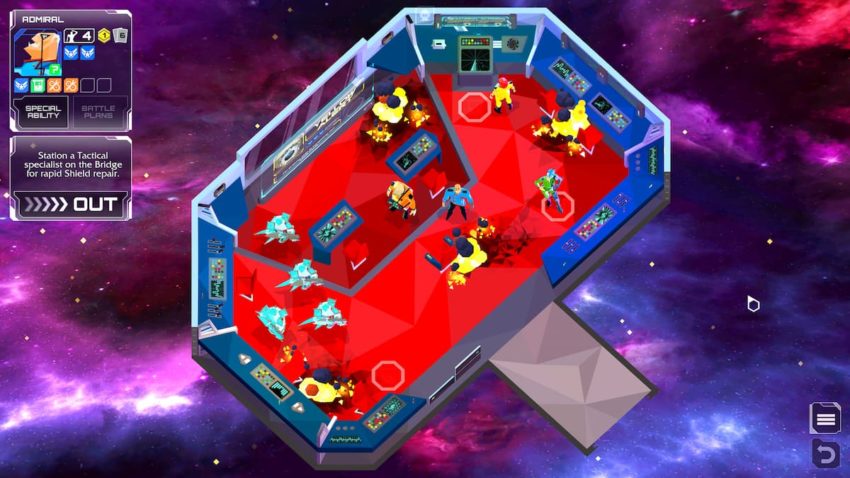It’s a confession made with a laugh, but it shows how difficult it is to translate the game people play at the table into what they will play on screen. This is very important because the video game acts as a digital dungeon master, Taylor said. Compliance with the rules is reversed; it is now the game itself that must know what can and cannot be done, not the players.
It can be surprisingly difficult to get these rules right from the start. One of the lucky instances was that Taylor was able to contact J.T. Smith, the original designer of Captain Dead, to make sure everything was as it should be. There are minor differences between the cardboard and digital versions, but fans can expect a very faithful adaptation of this eventful and fun game.
If Taylor has anything else going for his profession, it’s that he’s very good at it. Taylor is a gaming industry veteran and has worked as a level designer for companies such as Square Enix, Ubisoft, Rockstar and Eidos Montreal. He gave a very famous talk at the GDC titled Ten Principles of Good Level Design, which is now practically considered the bible for anyone who wants to design attractive, exciting and amazing levels. But there was a growing sense of dissatisfaction with AAA game development. In the last six years I’ve worked at AAA, almost everything I’ve worked on has been cancelled, Taylor says. You’re at the point where you’ve designed the whole thing and no one can play it.
The captain is dead
In 2017, the stars aligned and he decided to found his own studio, Thunderbox Entertainment, dedicated to transforming board games into digital games. It’s always better to regret what you did than what you didn’t, Taylor says. The main reason I founded Thunderbox Entertainment is because I love board games. I want him to be a kind of digital ambassador for those cool, iconic board games.
The first project Thunderbox tackled was Tsuro: Playing outside. With over 1.4 million downloads and the first board game application in over 90 countries, it has been a huge success for the team. It was followed by Roll For It! a dice game where you roll the dice, compare the results to the cards and try to outdo your friends. Now, The Captain is Dead is kind of an improvement in terms of scope and difficulty compared to the previous games.
When asked how they decided on the next Captain Dead project, the answer is surprisingly complicated. After we made our first games, we developed a quantitative selection process, Taylor explains. We look at turnaround time, rule complexity, characterization, chart style – lots of different factors – and we evaluate them all numerically. The captain’s death was one of the best options.
The basics of Captain Dead are simple. You control the crew of a spaceship that is under attack by aliens, and as your core is about to explode, you must escape. If you can fix the core, you win. If your shields are empty or too many aliens hit your ship, you lose. You have several crew members, each with different skills or strengths. A catastrophic wave is about to hit the ship: Transporters can break down, sensors can fail, and anomalies can increase gravity and slow down your movements. You must overcome them all to repair the core. It’s a crazy, fast-paced game based on the concept of imperfect knowledge of the players. You know what can happen, but you don’t know if and when.
Equivalence can be a problem when programming such a system, but the level of board game play meant that everything came together very quickly. The more I worked on the game, the more I realized how well tuned and balanced the original was, says Taylor. Captain Dead underwent five years of development and testing before it was released for desktop use. It’s a game where there’s a fine line between challenge and cruelty.
The video game version may even provide less information to players. Players don’t need to know all the rules or all the details, Taylor says. They learn them through play and can learn them over time. It’s one of the best things about a video game, the experience of learning and adding the knowledge you gain in the game to your tactics and plans.
Nevertheless, the developer should give enough information to the actors, especially when things don’t work. This is what iterative design is, a hallmark of video game development. In the beta, the button blocks you if you can’t perform an action, and that makes people confused, Taylor says. I thought it would be clever and the players would like it, but it’s not. Now if you press a key that does not work, you will get a message explaining why. This is a big difference between the board game and the digital version.
In a board game, you can just ignore or improvise the rules you don’t like at the time. But in a video game, you can’t just impose a state of failure. To continue the game, the player must know what to do if their first instinct is not an option. Your digital dungeon master should be able to train players, not just punish them.
Dan Taylor is a bigger nerd than you.
It’s just as important that you inspire your players to play. One of the main advantages of the video game over the desktop version is the soundtrack. Taylor used James Horner’s orchestral theme from Star Trek: Wrath of Khan as filler for the prototype, but after experimenting with 8-bit retro synthesis for sound effects, he decided to explore a similar option for the score. His love of the synthesizer and affection for Carpenter Brutus led him to the talented producer Laser Occam. There was so much panic and anticipation in the music, but at the same time an amazing energy that we needed, says Taylor. It has also helped to strengthen the identity of video games outside the office.
Four years after founding Thunderbox, and thanks to the company’s biggest project to date, Taylor is now in a very interesting position. With the global pandemic, groups of people who used to gather to play in person are looking for digital versions to play online with their friends. As people try to maintain some form of social connection, video games can once again fill a need that no one thought existed a year ago. People miss board games, they miss socializing with their friends, but they can take a digital board game and still play together, Taylor said. It was cool to fill a void for people. It’s super rewarding.
Captain is Dead comes out first. February 2021 on PC via Steam, Android and iOS.

























































































